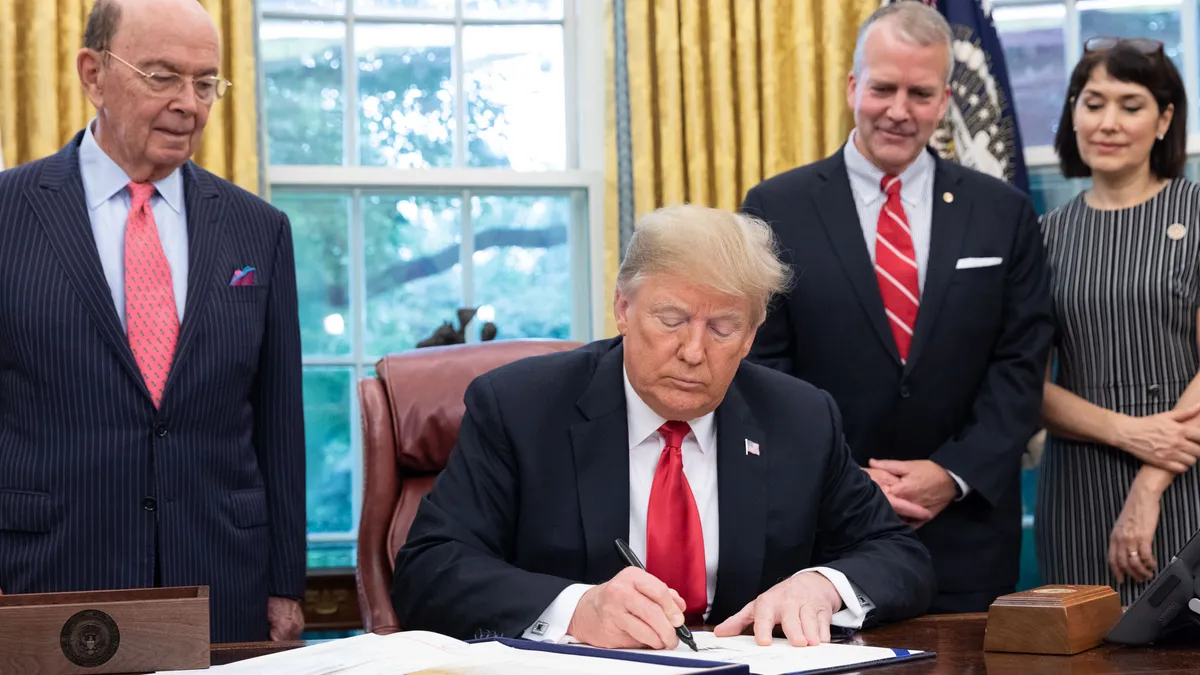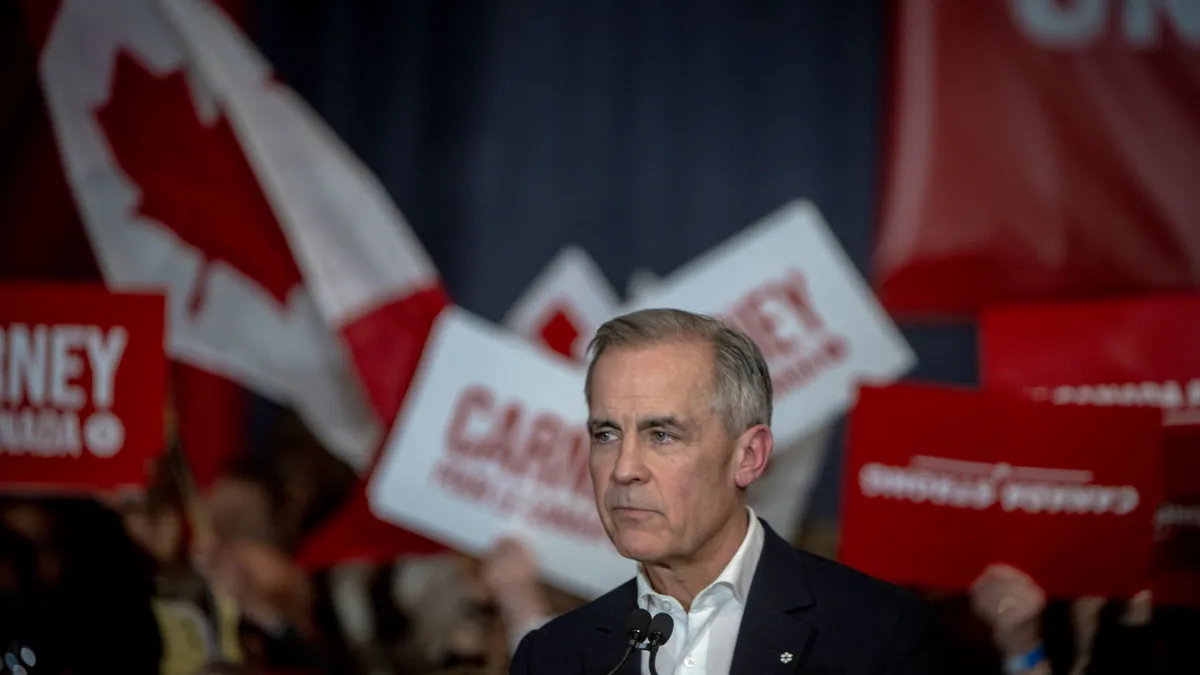Officials at the Owner-Operator Independent Drivers Association (OOIDA) are getting increasingly vocal about an industry-specific relief package for transport businesses.
The Federal Emergency Management Agency (FEMA) issued an April 10 report saying targeted relief was needed for the industry to protect the supply chain from failures.
And now a major ELD and fleet management company has garnered 20,000 signatures on a petition asking for more aid for smaller carriers.
The reason is the unique set of problems COVID-19 has thrown at carriers, especially smaller fleets that make up the vast majority of carrier businesses. With freight now dropping as panic buying subsides, some industry officials worry about a large number of carriers going off a "freight cliff," with inadequate liquidity and credit to survive past the crisis.
Current federal aid is not enough
FEMA said the freight system may require "targeted support" to continue serving demand and supply networks rather than encumber economic recovery, officials wrote in an April 10 report.
"Freight capacity has historically adapted well to economic volatility, albeit with some delays. However, the current combination of accelerated economic decline and operational constraints is unique," the report stated.
Congress has tried to help small business in general. But the government's Paycheck Protection Program (PPP) does not single out trucking, even though some transport industries got special consideration in the overall Coronavirus Aid, Relief, and Economic Security (CARES) Act. The CARES Act gave $50 billion to the airline industry in grants and loans.
Federal lawmakers have not moved on any new packages for trucking, although Congress is writing up a "phase four" of relief.
But an industry-specific program is needed, said KeepTruckin, a technology company based in San Francisco, warning of a coming financial disaster for many fleets, especially smaller ones. The company set up an online petition asking for expanded relief for smaller carriers along the lines of the PPP, the small business program which was replenished on Friday after it ran out of money.
"(PPP) is a great program for small businesses generally, but its calculation doesn't include those two very high costs — insurance premiums and truck payments," Travis Baskin, KeepTruckin head of regulatory affairs, told Transport Dive.
Insurance vexed the industry before the coronavirus outbreak. In November, the American Transportation Research Institute (ATRI) reported fleets saw an average premium increase of 12% from 2017 to 2018. Overall, carrier costs went up 7.7.%, ATRI said.
"If we are going to get out of the COVID-19 crisis, we must protect and preserve the trucking capacity we have now."

Travis Baskin
Head of regulatory affairs, KeepTruckin
The trucking technology company has about 250,000 customers on its network, Baskin said. As March progressed, he and other company officials noticed a downward trend in truck use. Their carriers saw a 25% drop in use, with many drivers struggling to find freight. Baskin said the weakening freight market in late March began to more seriously impact smaller carriers. It was not expected so soon, after the "glut" of freight in February and most of March, when panic buying hit retail stores, and factories had not yet idled, he said.
Baskin said he's worried a number of smaller carriers will disappear, and when freight demand returns to normal, capacity will not be there. Shrunken capacity could mean higher rates, freight delays and more headaches for the economy.
"If we are going to get out of the COVID-19 crisis, we must protect and preserve the trucking capacity we have now," Baskin said, noting the company plans to present the petition to the White House in short order.
A coming disaster for small carriers?
OOIDA said it believes the COVID-19 crisis could exacerbate an imbalance in trucking competition. The picture OOIDA and KeepTruckin paint includes coming bankruptcies, idled or unemployed drivers and a freight market that has dried up as the pandemic's panic buying dissipates while factories are shut down or slowed. The scenario could leave the most basic deliveries to super fleets, such as FedEx Freight, Knight-Swift Transportation Holdings and Schneider.
Bigger fleets, with bigger cash accounts and credit lines, can absorb shocks from the freight decline, Norita Taylor, director of OOIDA public relations, told Transport Dive. The nation's largest 10 fleets have at least 16,260 tractors. Although "mega fleets" of 5,000 or more trucks number only 76, they have 4.3 million tractors, making up 53% of the U.S. total.
The majority of carriers have six or fewer trucks, according to OOIDA.
Carriers that manage between one and 19 trucks have 1.44 million tractors, only 17% of the total. The smaller carriers' business have been steadily falling off as freight dries up. The association's research found 84% of fleets have between one to six trucks. Ninety-four percent of fleets — more than 500,000 companies — have 19 or fewer trucks, according to OOIDA.
Smaller carriers could go bankrupt by the hundreds. Already, small carriers of four or fewer truckers have had 50% more impact from the shrinking freight market than larger carriers, said Baskin, pointing to KeepTruckin's internal data.
Taylor said OOIDA has been writing and talking to the White House and Congress, on a regular basis, to convey the urgency of the situation.
Risks to small carriers, risks to economy
Todd Spencer, OOIDA's president and CEO, wrote an April 14 letter to Congress asking lawmakers to expand programs for small carriers.
"To weather this economic downturn, small-business truckers must have access to assistance that Congress promised through the CARES Act with the Paycheck Protection Program (PPP) and Emergency Economic Injury Disaster Loan (EIDL) program," Spencer wrote. "Unfortunately, our members are experiencing significant difficulties in securing this assistance and encountering a chasm between what was touted when this legislation was enacted and what they are actually receiving."
Spencer said a significant disruption will occur if Congress does not expand PPP and other loan programs for smaller carriers.
"Small-business truckers make up 96% of motor carriers, and many of them risk bankruptcy in the current situation. If these businesses are allowed to fail, there will certainly be delays and increased costs across the economy when restarting from this crisis," Spencer wrote.
Larger fleets, when contacted by Transport Dive, deferred to the American Trucking Associations.
"The trucking industry isn't looking for a bailout, but our members have been calling for assistance bridging the economic shutdown and ensuring our drivers and companies are ready to turn the economy back on," Bill Sullivan, ATA executive vice president of advocacy, said in a statement emailed to Transport Dive.
"Small-business truckers make up 96% of motor carriers, and many of them risk bankruptcy in the current situation. If these businesses are allowed to fail, there will certainly be delays and increased costs across the economy when restarting from this crisis."

Todd Spencer
OOIDA president and CEO
Sullivan said fleets have diverse ideas about financial relief that can be offered during the crisis.
"For larger trucking businesses, our members have stressed the need to ensure liquidity, so low or no-interest loans should help businesses survive the lockdown phase of this crisis and move into the recovery, where trucking will be key to turning the economy's lights back on," said Sullivan. "In addition, we are hearing from our members that there may be benefit in some minor tax provisions that stimulate trucking activity or other economic sectors, things like a holiday from the federal excise tax, or looking at changes to eligibility for Small Business Administration or Treasury lending rules to cover things like equipment leases."
Transport Dive reached out to the White House, the U.S. Department of Transportation and the U.S. Treasury Department but did not receive specific comments about the proposals to expand financial relief to carriers.
Correction: A previous version of this article mischaracterized KeepTruckin's network.




















